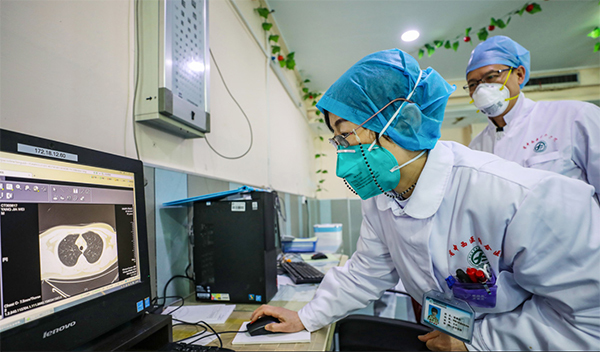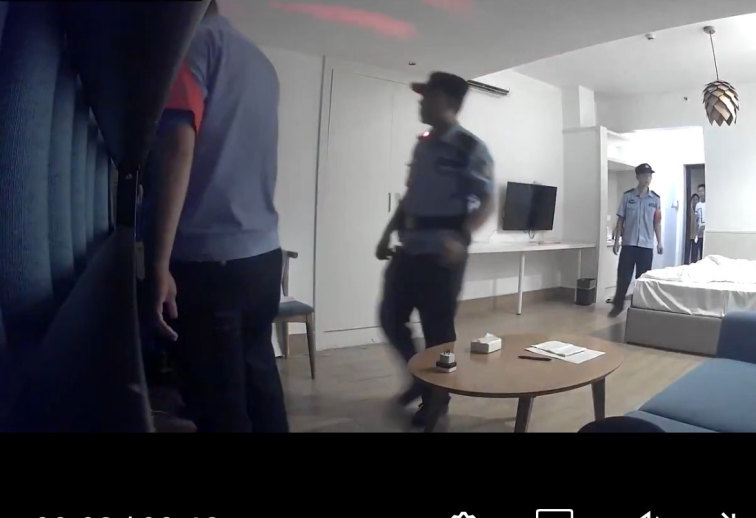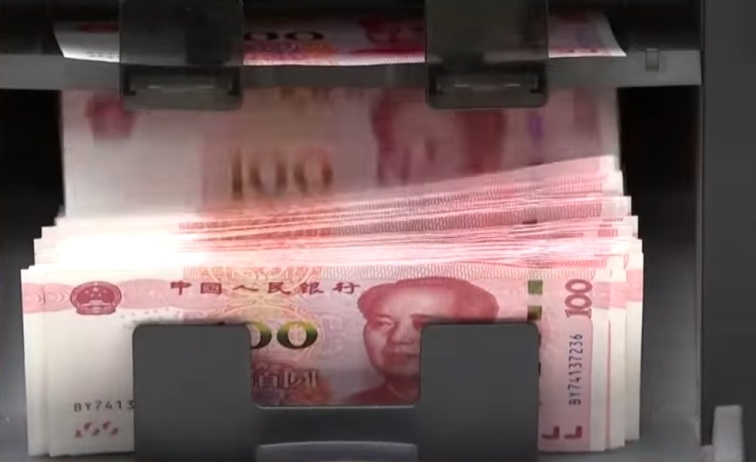A resident of the community where actor Yu Menglong died revealed that they received hush money. In the screenshots, “yw” means 10,000 yuan, the laughing face with a hand over the mouth represents hush money, and the cloud-rain icon stands for “Yu Menglong.” (Video screenshot)
[People News] Chinese actor Yu Menglong died under mysterious circumstances after falling from a building. Online rumours suggest the case may involve arms deals and money laundering tied to high-ranking CCP elites, and that Yu may have been silenced—possibly meeting the same fate as Luo Shuaiyu, a medical intern in Hunan who also died suspiciously. Investigation into Yu’s social connections unexpectedly led to links with former top CCP leader Bo Xilai, suggesting a terrifying hidden scandal that even shocked Western media. The U.S. magazine Foreign Policy reportedly featured the case on its English-language front page.
Public Anger Directed at Xi Jinping’s Family
Yu Menglong died on September 11 after a mysterious fall. Initial rumours online claimed he had resisted the sexual exploitation (“casting couch”) of a so-called red second-generation tycoon in the entertainment industry and was murdered. Others speculated that the powerful figure was none other than the brother of CCP General Secretary Xi Jinping, because only an emperor’s brother could be called “prince.” Another claim was that Yu refused to help with money laundering and was brutally killed for it.
The Taiwanese media program “Forward-Looking Era” commented: “The Yu Menglong case has ignited fires in Zhongnanhai, implicating Xi Jinping himself. The latest revelations about Yu’s final note point instead to Xi Yuanping (Xi Jinping’s brother). For the past one to two months, he has been at the centre of every online political scandal. A month ago, why was Australia’s Yang Lanlan carrying massive sums of money? Online discussions suggested she was Xi Yuanping’s illegitimate daughter. Now, revelations about Yu Menglong’s death point to Xi Yuanping as the real power behind the scenes.”
Netizens also discovered that Yu and several others in the entertainment industry registered multiple companies together. One of Yu’s studios even registered a trademark for arms trading, deepening suspicions of money laundering.
Other netizens claimed that actor Guo Junchen had also been chosen as a “sacrificial offering” in the CCP elite’s so-called “occult ritual.”
On June 21, 2019, the U.S. State Department released its 2018 International Religious Freedom Report. At the press conference, then–Secretary of State Mike Pompeo emphasised that since its founding, the CCP has been deeply hostile to all religious beliefs. Groups such as Falun Gong face severe persecution in China. The U.S. government publicly stated that the CCP seeks to play the role of “god” on earth. In effect, Washington has recognised the CCP as a cult organisation.
Links Traced Back to Bo Xilai’s Inner Circle
According to online reports, Yu Menglong’s final message to his mother included: “I was being toyed with by the so-called ‘prince’… Every time I saw the numbers on those bank transfers, I felt sick. That’s not my money—it’s dirty, blood-stained money.”

A resident of Yu Menglong’s community revealed they saw his face at the time of the incident and later received hush money. (Video screenshots)
Self-media commentator Li Muyang reported that witnesses said a few days after the incident, people visited the Sunshine Upper East community where Yu died. They took photos of the floor involved and noticed that the official police seals had already been torn off, as if nothing had happened. Others reported seeing drag marks in the hallway.
Residents also recalled hearing violent crying and the sounds of objects falling on the night of Yu’s death. But afterwards, people came to their doors offering money to keep quiet. Some received tens of thousands of yuan in “hush fees,” while others received death threats—red paint splashed on doors, car tyres slashed—forcing silence. It was rumoured that the total hush money distributed across the community amounted to hundreds of millions of yuan. Some online sources suspected the money came from Tian Hairong, associated with “Widow Capital.” She controls assets worth billions, so even 50 million yuan would mean little to her.
According to a submission from Yu Menglong’s junior colleague, the actress Tian Hairong—whose former husband was Xu Ming of “Widow Capital”—controls assets worth 13 billion yuan. Xu Ming, the former head of Dalian Shide Group, died in prison, but a month ago, he had already arranged paid media posts foreshadowing a “huge scandal” involving Eternal Love (Three Lives, Three Worlds, Ten Miles of Peach Blossoms).
Commentator Li Dayu noted in his self-media program that Xu Ming, Tian Hairong’s late husband, had once been the financial steward of fallen CCP Politburo member Bo Xilai. The Bo family committed numerous atrocities while in Dalian, including large-scale organ harvesting and even running a human body processing factory.
According to multiple reports, Bo Xilai and his wife, Gu Kailai, were among the first perpetrators of forced organ harvesting of Falun Gong practitioners. Gu not only profited from selling organs but also from trafficking Falun Gong corpses for huge profits, earning her the reputation of an “unforgivable demon.” Their British associate, Neil Heywood, who laundered money for them, was later murdered by Gu when he threatened to expose her overseas assets after not receiving promised commissions. At the time, Chongqing police chief Wang Lijun, who had helped Gu destroy evidence, was himself arrested.
Wikipedia records confirm that on September 19, 2012, during his trial, Wang Lijun testified that Xu Ming had close ties to Bo Xilai and himself, even gifting Wang’s relatives two Beijing apartments worth 2.85 million yuan. Xu Ming was sentenced in 2013 and died of illness in prison on December 4, 2015, at the age of 44.
Xu Ming’s role as Bo Xilai’s financial manager makes it unsurprising that he was familiar with the Bo family’s organ trafficking and money-making schemes. Through his ex-wife Tian Hairong, Xu’s network could reach many entertainment stars, leveraging political connections to pressure them into using their company accounts for money laundering. Beyond arms deals, such laundering may have included proceeds from the organ trade. Though Xu Ming died years ago, this criminal operation allegedly continues today.
When Yu Menglong realised the origins of such money, he reportedly felt sick and repulsed, describing it as “dirty, blood-stained money.”
Same Fate as Intern Doctor Luo Shuaiyu?
What did Yu mean by “blood-stained money”? Likely that CCP elites controlling organ harvesting operations funnelled organ-trafficking profits through Yu’s company accounts for laundering. Yu refused and even gathered evidence—leading to his silencing.
This case evokes the death of Luo Shuaiyu, a 28-year-old medical intern in the transplant department of Xiangya No. 2 Hospital, Central South University in Hunan. Luo had collected and reported evidence of the hospital’s involvement in illegal organ harvesting and trafficking. On May 8, 2025, he suddenly fell to his death under highly suspicious circumstances and was officially declared a suicide. Yet millions of Chinese netizens questioned the narrative: how could Luo crawl through a hole only 80 cm wide and fall 7 meters away from it? Many believe Luo was killed for exposing illegal transplant operations.
Thus, Yu Menglong and Luo Shuaiyu may have shared the same fate for the same reason.
Yu Menglong on the Cover of Foreign Policy
Within China, “Yu Menglong” has now become a sensitive keyword—censored across state-controlled media. Yet Western mainstream outlets have taken notice. On October 1, U.S. magazine Foreign Policy ran the Yu Menglong case on its English-language front page.
YouTube host David’s Perspective explained that Foreign Policy is a serious outlet with 6 million readers, including U.S. politicians, academics, business leaders, and diplomats worldwide. The piece was written by American journalist Kevin Xu and detailed Yu’s background, death, and fans’ reactions.
The article noted how the CCP quickly moved to censor discussion, deleting accounts that questioned the official narrative or demanded further investigation. But creative netizens fought back—opening new accounts, spreading subtle critiques, and even taking their voices to foreign media. Some conducted grassroots investigations to fill in the gaps. Public anger at elite impunity only intensified, with citizens determined to uncover the real perpetrators.
The article highlighted that some elites in China are effectively above the law. Yu’s erasure underscored this reality: if a celebrity could be silenced so easily, what chance does an ordinary citizen have? This absence of the rule of law reminded many of the darkest days of the COVID-19 pandemic, when ordinary Chinese felt utterly helpless under authoritarian rule.
During the pandemic, a young couple in Shanghai, threatened and coerced into taking mandatory PCR tests, told the health enforcers in hazmat suits: “We are the last generation.” Their despair underscored the idea that as long as the CCP exists, the Chinese people’s chance of survival will be choked off. Thus, the article concluded, preserving a future for the Chinese people requires not only the fall of the CCP but also breaking free from its ideological grip. For individuals, the “Three Withdrawals” (quitting the Party, the Youth League, and the Young Pioneers) remains the simplest way to reclaim hope for survival.
(People News exclusive)











News magazine bootstrap themes!
I like this themes, fast loading and look profesional
Thank you Carlos!
You're welcome!
Please support me with give positive rating!
Yes Sure!